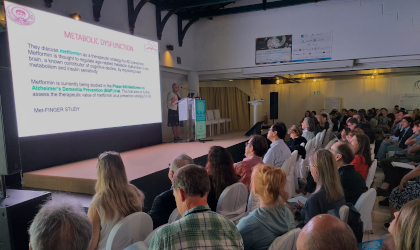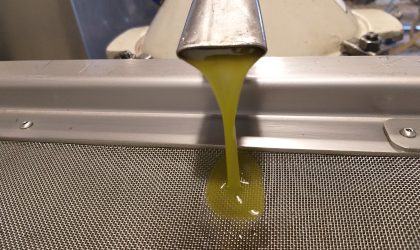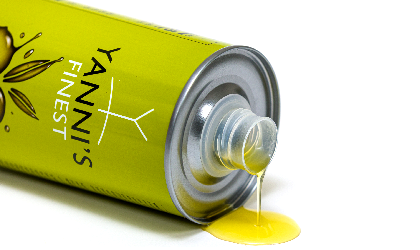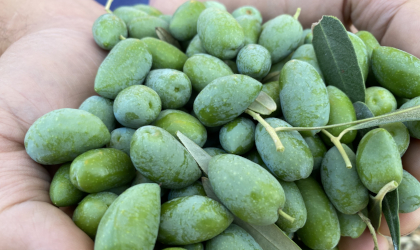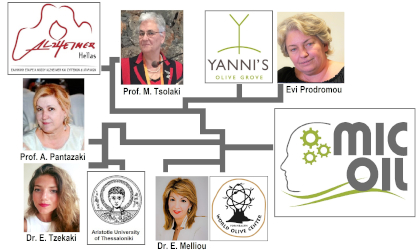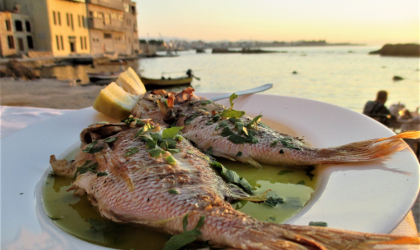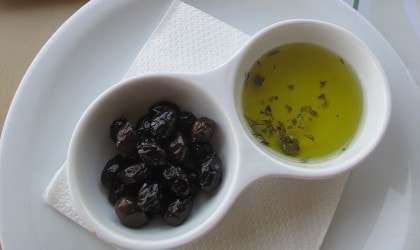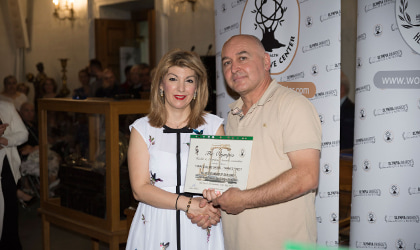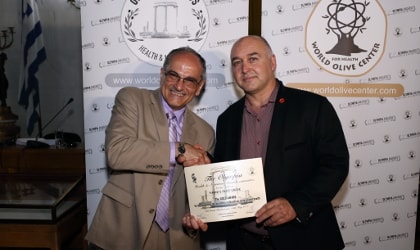- Details
- Written by Lisa Radinovsky
- Category: Olive Oil Health Benefits
Scientific research indicates that high phenolic extra virgin olive oil (HPEVOO) can play an important role in combatting many diseases. At the 2024 Olympia Health & Nutrition Awards ceremony organized by the World Olive Center for Health (WOCH) in Athens, scientists presented some of the latest results of research on HPEVOO that WOCH has supported.
- Details
- Written by Lisa Radinovsky
- Category: Olive Oil Health Benefits
The international recognition of high phenolic extra virgin olive oil and its disease-fighting properties was the focus of the 9th Olympia Health & Nutrition Awards ceremony on June 27 in Athens, Greece. With more than 600 olive oil samples tested for health-protecting natural phenolic compounds at the University of Athens this year, over 250 were awarded.
- Details
- Written by Lisa Radinovsky
- Category: Olive Oil Health Benefits
At the Cretan Lifestyle Conference in Rethymno, Crete in November, Dr. Magda Tsolaki shared several types of evidence from a clinical trial to support her claim that extra virgin olive oil is “more promising than any drug being studied or any drug which already has been approved” for prevention of Alzheimer’s disease, as well as being safe and ready to use.
- Details
- Written by Lisa Radinovsky
- Category: Olive Oil Health Benefits
What is high-phenolic olive oil? It pops up more and more on social media, websites, and news articles, yet it is usually not clearly defined. A Greek scientific team seeks to change that. They analyzed more than 5700 olive oil samples over 11 years, then proposed a definition of “high-phenolic olive oil” partly based on how long its healthy phenols last.
- Details
- Written by Lisa Radinovsky
- Category: Olive Oil Health Benefits
The U.S. Food and Drug Administration (FDA) has approved a controversial drug that may slow cognitive decline in patients in the early stages of Alzheimer’s. Uncertainty about the drug’s efficacy and cost and concern about the possibility of serious side effects led three FDA advisory committee members to resign. Could extra virgin olive oil do better?
- Details
- Written by Lisa Radinovsky
- Category: Olive Oil Health Benefits
The Liokareas Olive Oil Company’s High Phenolic Extra Virgin Olive Oil (EVOO) won first place at the 2020/2021 World’s Best Healthy EVOO Contest in Spain, tied with an EVOO from Chile. Three other Greek companies, Eirini Plomariou, G Team, and Therianos Family, also ranked among the top ten healthy EVOOs at this unusual international olive oil competition.
- Details
- Written by Lisa Radinovsky
- Category: Olive Oil Health Benefits
The first study to use human volunteers to test the ability of extra virgin olive oil (EVOO) to delay the onset of Alzheimer’s disease has yielded exciting results. It shows that a long-term diet rich in EVOO containing a medium to large amount of natural phenolic compounds can help protect against Alzheimer's disease and mild cognitive impairment.
- Details
- Written by Lisa Radinovsky
- Category: Olive Oil Health Benefits
We know we should eat nutritious foods to stay well, especially during the coronavirus pandemic. Many also realize extra virgin olive oil (EVOO) offers numerous health benefits, so it can play a vital role in a healthy diet. While no food has been proven to prevent or treat COVID-19, some evidence suggests EVOO could help us combat the novel coronavirus.
- Details
- Written by Lisa Radinovsky
- Category: Olive Oil Health Benefits
Olive oil is good for us--so good that it is considered both a healthy food and a delicious medicine! There are so many articles about the scientific evidence for the health benefits of extra virgin olive oil that it’s hard to keep track of them. Here is an overview, followed by links to the best, clearest, most useful recent articles I’ve read.
- Details
- Written by Lisa Radinovsky
- Category: Olive Oil Health Benefits
“Some scientists say olive oil should be considered only a food, but the market seems to disagree,” said Prokopios Magiatis. He joined other olive oil experts in Delphi, Greece at the 2nd International Yale Symposium on Olive Oil and Health in December to discuss the impressive flavors, many uses, and promising health benefits of extra virgin olive oil.
- Details
- Written by Lisa Radinovsky
- Category: Olive Oil Health Benefits
The Olympia Health and Nutrition Awards ceremony in Athens spotlighted high phenolic olive oils and evidence of their ability to help fight many diseases. For example, groundbreaking study results announced there suggest that high phenolic olive oils help combat at least one type of leukemia, breast cancer, mild cognitive impairment, and Alzheimer’s.
- Details
- Written by Lisa Radinovsky
- Category: Olive Oil Health Benefits
At the Olympia Health & Nutrition Awards conference in Athens, Greece in May, Dr. Khalid El Sayed discussed his research group’s groundbreaking discoveries: oleocanthal, a natural phenolic compound found in extra virgin olive oil, reduced the recurrence of one type of breast cancer in mice and limited the growth of other types of recurrent tumors.
- Details
- Written by Lisa Radinovsky
- Category: Olive Oil Health Benefits
Results of a recent scientific study of mice at the University of Louisiana at Monroe suggest oleocanthal rich extra virgin olive oil deserves to be designated a "medical food." Researchers led by Dr. Amal Kaddoumi demonstrated for the first time that this type of olive oil can treat symptoms of Alzheimer’s disease in mice when used in their daily diet.
- Details
- Written by Lisa Radinovsky
- Category: Olive Oil Health Benefits
With 2500 entries, the 2018 Olympia Health & Nutrition Awards included more samples than any other olive oil competition in the world. Yet this was not its major claim to fame. Most olive oil contests focus on panel tests of flavor and aroma, but the Olympia Awards emphasize extra virgin olive oil’s health benefits and scientific evidence of these benefits.
- Details
- Written by Press Release
- Category: Olive Oil Health Benefits
The International Olive Council, the largest and oldest global intergovernmental olive oil and table olives organization, partnered with the University of California, Davis (UC Davis) Olive Center to present impressive evidence for olive oil’s health benefits at an International Conference on Olive Oil and Prevention of Chronic Disease on January 17.
- Details
- Written by Lisa Radinovsky
- Category: Olive Oil Health Benefits
Animal studies have suggested extra virgin olive oil (EVOO) may help fight off Alzheimer’s disease. Now the Greek Association of Alzheimer’s Disease and Related Disorders and Yanni's Olive Grove have begun a clinical trial in humans to evaluate the effect of EVOO on amnesic patients diagnosed with Mild Cognitive Impairment, which leads to Alzheimer’s.
- Details
- Written by Lisa Radinovsky
- Category: Olive Oil Health Benefits
At a workshop for Greek olive oil producers in Chania, Crete, Dr. Prokopios Magiatis and Dr. Eleni Melliou of the University of Athens discussed the health benefits of important phenols in olive oil, as well as the economic benefits some of the healthiest extra virgin olive oils in the world could bring their producers and the steps required to make them.
Olive Oil Health Benefits Web Links
- Higher Consumption of Polyphenols Linked to Lower Risk of Contracting Covid-19
- Research Shows the Role of Polyphenols in Inhibiting Cancer Metastasis
- Is Extra Virgin Olive Oil the Critical Ingredient Driving the Health Benefits of a Mediterranean Diet? A Narrative Review
- Biophenols in Extra Virgin Olive Oil Linked to Improved Outcomes in Obesity and Prediabetes
- Chemical compounds in extra virgin olive oil could aid in the treatment and prevention of Alzheimer’s disease
- The health benefits of olive oil in cardiovascular disease prevention: An update
- Virgin Olive Oil Ranks First in a New Nutritional Quality Score Due to Its Compositional Profile
- Auburn researcher finds olive oil to improve brain health, memory in mild cognitive impairment individuals
- Extra-Virgin Olive Oil Enhances the Blood–Brain Barrier Function in Mild Cognitive Impairment: A Randomized Controlled Trial
- Study Links Cooking Methods and Health
- High-Phenolic EVOO May Improve Prognosis of Some Leukemia Patients, Research Suggests
- Olive Oil Health Benefits
- Olive Oil Reduces Both Total and Cause-specific Mortality
- Olive oil intake and cancer risk: A systematic review and meta-analysis
- Oleocanthal in Olive Oil Lowers White Blood Cells (WBC) in Chronic Lymphocytic Leukemia (CLL) Patients
- Olive Oil & Type 2 Diabetes
- How Much Olive Oil Per Day Should You Consume?
- Antiviral Functional Foods and Exercise Lifestyle Prevention of Coronavirus
- High-Polyphenol EVOO May Lower Risk of Vascular Diseases Associated with Diabetes
- Using olive oil instead of these foods could add years to the life of your heart, study says
- Olive Oil: Health Benefits, Nutritional Information
- Consuming High-Polyphenol EVOO Reduces Blood Pressure, Study Finds
- Health Benefits of Olive Oil (Short Video)
- Found in Virgin Olive Oil, Squalene Benefits Skin and Body
- Greek Scientists Conduct Trials to Find Olive Oil Cancer Cure
- Welcome to the EVOO-lution: Greek Olive Oils Add Science to Tradition
- Key Ingredient in Olive Oil Destroys Cancer Cells
- Superfood: Why Greek Olive Oil is a Food and Medicine in One
- Could olive oil help you live longer? Exploring the cooking staple's health benefits (Video)
- Research Finds Extra Virgin Olive Oil Safest, Most Stable for Cooking
- New Study Confirms Olive Oil Retains Health Benefits During Cooking
- Fight Alzheimer’s disease with olive oil, Auburn University researcher says
- Eating olive oil once a week may be associated with making blood less likely to clot in obese people
- FDA Allows Cardiovascular Health on Olive Oil Labels
- Olive Oil and Healthy Eating (article narrated on video)
- Extra Virgin Olive Oil – What Makes It So Special?
- Olive Oil Health & Science
- Olive Oil Offers Unique Cardiovascular Protection
- Olive Oil Reduces Cardiovascular Problems Associated with Diabetes
- 7 Superfoods that Can Reduce Your Risk of Stroke
- Exclusive Olive Oil Consumption Protects Against Coronary Artery Disease
- Component in EVOO [Extra Virgin Olive Oil] Kills Cancer Cells
- Powerful Anti-Inflammatory Benefits of Olive Oil
- Role of Olive Oil in the Hallmarks of Aging
- Oleocanthal, a Phenolic Derived from Virgin Olive Oil: A Review of the Beneficial Effects on Inflammatory Disease
- Researchers Say New Tool Measures Olive Oil ‘Healthfulness’
- Olive Oil May Protect Against Age-Related Macular Degeneration
- Extra Virgin Olive Oil Better for Frying Fish
- The Olive Oil Diet [with Dr. Mary Flynn]
- Extra Virgin Olive Oil Improves Health Outcomes for Fibromyalgia Sufferers
- Oleocanthal, a Polyphenol in Olive Oil, Positively Impacts Human Melanoma Cells
- Researchers Link Oleocanthal to Cancer, Alzheimer’s Prevention
- Extra Virgin Olive Oil May Prevent Alzheimer’s, Study Finds
- Extra-Virgin Olive Oil Preserves Memory and Protects Brain Against Alzheimer's Disease, New Research at Temple Shows
- Comparing the Lipid-Lowering Effect of EVOO and Statins in Type 2 Diabetes
- How Eating Fat Can Save Your Life
- Virginia Tech biochemists dip into the health benefits of olives and olive oil
- Aristoleo Awards Winners 2017 [some of the world's healthiest olive oils]
- Frying Vegetables in Extra Virgin Olive Oil Recommended for Men With Prostate Cancer
- What are the Benefits of Olive Oil? [cardiovascular disease prevention]
- Olive Oil Compound Kills Cancer Cells In Less Than An Hour: All-Powerful Oleocanthal
- How the Mediterranean diet and Extra Virgin Olive Oil aid in the prevention and management of diabetes
- How the Combination of Olive Oil and Sleep Can Prevent Cardiovascular Events
- Compound Found in Olives May Help Prevent Deadly Type of Breast Cancer
- Mapping the Polyphenols of Greek EVOOs for Healthy Aging
- Following a MedDiet with EVOO Lowers Need for Medications in Diabetics
- Extra Virgin Olive Oil Consumption Can Protect Against Dementia
- Olive Oil For the Prevention of Colon Cancer
- Olive Oil Nutrition: What is the Difference Between Antioxidants and Polyphenols?
- Health Effects of Olive Oil and the Mediterranean Diet: A Review of Recent Systematic Literature Reviews
- Olive Oil Is the Next Weight Loss EVOOlution
- Studies Find Olive Oil Improves Oral Health and Prevents Periodontitis
- 5 Ways Olive Oil Supports Healthy Aging + Longevity
- Oleocanthal: The Secret of Olive Oil is No Secret Anymore




